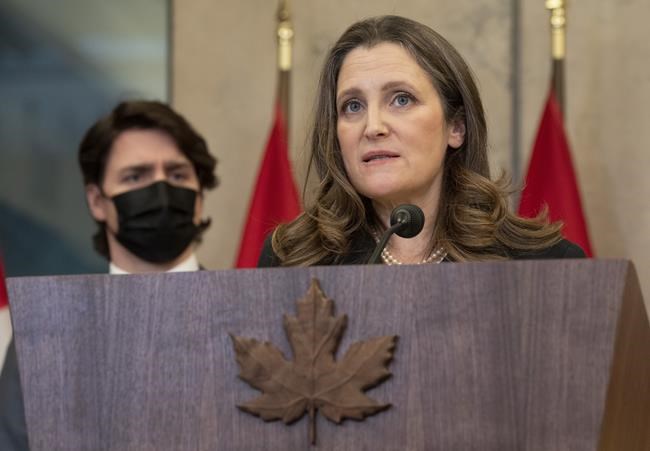Feds go after blockade financing with expanded Fintrac powers, directions to banks
Advertisement
Read this article for free:
or
Already have an account? Log in here »
To continue reading, please subscribe:
Monthly Digital Subscription
$0 for the first 4 weeks*
- Enjoy unlimited reading on winnipegfreepress.com
- Read the E-Edition, our digital replica newspaper
- Access News Break, our award-winning app
- Play interactive puzzles
*No charge for 4 weeks then price increases to the regular rate of $19.00 plus GST every four weeks. Offer available to new and qualified returning subscribers only. Cancel any time.
Monthly Digital Subscription
$4.75/week*
- Enjoy unlimited reading on winnipegfreepress.com
- Read the E-Edition, our digital replica newspaper
- Access News Break, our award-winning app
- Play interactive puzzles
*Billed as $19 plus GST every four weeks. Cancel any time.
To continue reading, please subscribe:
Add Free Press access to your Brandon Sun subscription for only an additional
$1 for the first 4 weeks*
*Your next subscription payment will increase by $1.00 and you will be charged $16.99 plus GST for four weeks. After four weeks, your payment will increase to $23.99 plus GST every four weeks.
Read unlimited articles for free today:
or
Already have an account? Log in here »
Hey there, time traveller!
This article was published 14/02/2022 (1398 days ago), so information in it may no longer be current.
OTTAWA – The federal government is broadening the scope of anti-money laundering rules and directing banks to cut off services to those suspected of aiding the trucker protesters as it looks to put an end to what it says are illegal blockades.
Finance Minister Chrystia Freeland also said in a late afternoon news conference Monday that crowdfunding sites, some of which are being used to channel money to the protesters, will now be required to report to the Financial Transactions and Reports Analysis Centre of Canada.
The move, to be made permanent, will allow Fintrac to make more information available to police and other enforcement agencies, she said.

“We are making these changes because we know that these platforms are being used to support illegal blockades and illegal activity, which is damaging the Canadian economy,” she said.
Freeland said that under the Emergency Act, the government has also authorized banks to cut off services to both individual and business clients who they suspect are aiding the blockades.
She said the banks would be protected against civil liability in doing so.
The government has directed financial institutions to review their relationship with anyone involved in the blockades and to report findings to the RCMP or CSIS, she said.
“This is about following the money. This is about stopping financing of these illegal blockades.”
The measures allow for such actions as an insurer suspending coverage and a bank freezing a truck owner’s corporate or personal accounts.
As well as chartered banks and credit unions, Fintrac requires reporting from institutions such as insurers and securities dealers, and from professionals such as accountants and real estate brokers.
Freeland said federal institutions have broad new authority to share information with the banks and work to end funding for the groups behind the blockades.
Canada’s big banks did not immediately respond to a request for comment. The Canadian Bankers Association declined to comment.
Prime Minister Justin Trudeau invoked the Emergencies Act to bring to an end to antigovernment blockades he says are illegal and not about peaceful protest.
This report by The Canadian Press was first published Feb. 14, 2022.


